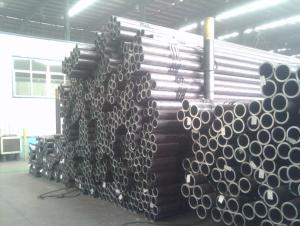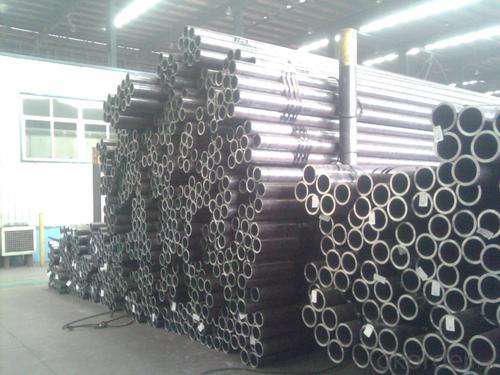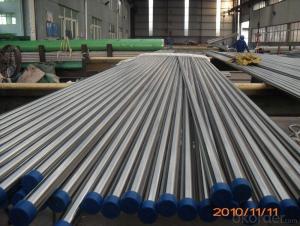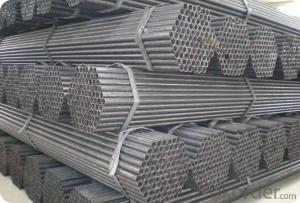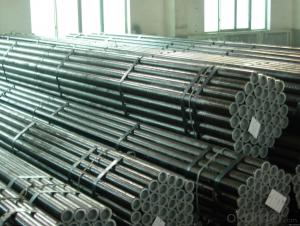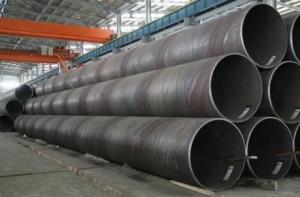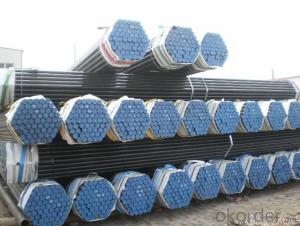Welded Steel Pipe Steel Pipe API SPEC 5CT
- Loading Port:
- Tianjin
- Payment Terms:
- TT or LC
- Min Order Qty:
- 40 m.t.
- Supply Capability:
- 8000 m.t./month
OKorder Service Pledge
OKorder Financial Service
You Might Also Like
1、Structure of Welded Steel Pipe API SPEC 5CT:
Welded Steel Pipe is to be used for conveying gas, water, and petroleum foroil and natural gas industries. And used for structural steel pies purpose. As the manufacturing process does not include any welding, seamless pipes are perceived to be stronger and more reliable. Historically seamless pipe was regarded as withstanding pressure better than other types, and was often more easily available than welded pipe.
2、Main Features of Welded Steel Pipe API SPEC 5CT:
• High manufacturing accuracy
• Good visual effect
• Reasonable price
3、Welded Steel Pipe API SPEC 5CT: Specification:
Standard | GB, DIN, ASTM ASTM A106-2006, ASTM A53-2007 |
Grade | 10#-45#, 16Mn 10#, 20#, 45#, 16Mn |
Thickness | 8 - 33 mm |
Section Shape | Round |
Outer Diameter | 133 - 219 mm |
Place of Origin | Shandong, China (Mainland) |
Secondary Or Not | Non-secondary |
Application | Hydraulic Pipe |
Technique | Cold Drawn |
Certification | API |
Surface Treatment | factory state or painted black |
Special Pipe | API Pipe |
Alloy Or Not | Non-alloy |
Length | 5-12M |
Outer Diameter | 21.3-610mm |
Grade | 20#, 45#, Q345, API J55, API K55, API L80, API N80, API P110, A53B |
Standard | ASME, ASTM |
1) Material:20#(ASTM A 106/A53 GRB.API5LGRB,GB),45#,16Mn,10#.
4、Packaging & Delivery
Packaging Details: | seaworthy package,bundles wrapped with strong steel strip |
Delivery Detail: | 15-30days after received 30%TT |
5、FAQ of Welded Steel Pipe API SPEC 5CT:
①How is the quality of your products?
Our products are manufactured strictly according to national and internaional standard, and we take a test
on every pipe before delivered out. If you want see our quality certifications and all kinds of testing report, please just ask us for it.
Guaranteed: If products’ quality don’t accord to discription as we give or the promise before you place order, we promise 100% refund.
6、 Welded Steel Pipe API SPEC 5CT: Images:
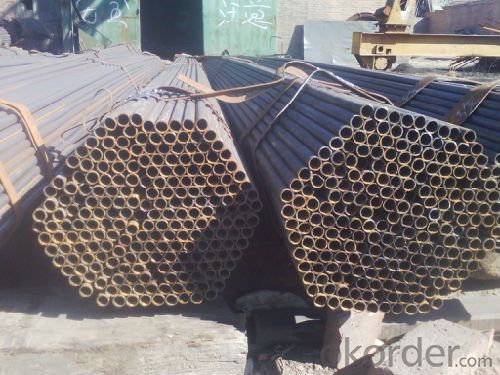
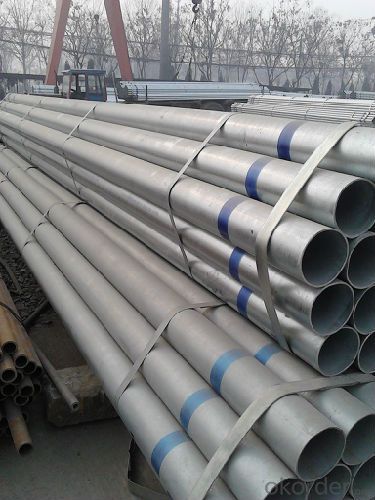
- Q: What are the different types of hangers used for supporting steel pipes?
- There are several different types of hangers used for supporting steel pipes, including clevis hangers, riser clamps, U-bolts, beam clamps, and pipe rollers. Clevis hangers have a clevis-shaped bracket that attaches to the pipe and can be suspended from a beam or threaded rod. Riser clamps are used to support vertical pipes and are typically attached to a wall or structural member. U-bolts are used to secure pipes to beams or other structural elements. Beam clamps are designed to attach to overhead beams and provide support for the pipe. Pipe rollers are used to support pipes on horizontal surfaces and allow for easy movement or rotation.
- Q: What is the difference between steel pipes and PVC-M pipes?
- Steel pipes are made of a strong and durable metal, while PVC-M pipes are made of a thermoplastic material known as polyvinyl chloride modified. The main difference lies in their composition and characteristics. Steel pipes are typically heavier and more robust, offering greater strength and resistance to high pressure and temperature. On the other hand, PVC-M pipes are lightweight, flexible, and corrosion-resistant, making them ideal for applications where chemical resistance and ease of installation are crucial factors.
- Q: How are steel pipes coated for protection?
- Steel pipes are commonly coated for protection through a process called galvanization. This involves immersing the pipes in a bath of molten zinc, creating a protective layer that prevents corrosion and extends their lifespan. Additionally, other methods such as epoxy coatings or polyethylene wrappings can be used to provide additional protection against external factors.
- Q: How are steel pipes recycled at the end of their life cycle?
- Steel pipes are typically recycled at the end of their life cycle through a process called steel recycling. This involves collecting the used pipes, separating them from other materials, and then melting them down to be formed into new steel products. The recycling process not only helps conserve valuable resources but also reduces the need for new steel production, making it an environmentally sustainable solution.
- Q: How do you transport steel pipes safely?
- Steel pipes can be transported safely by properly securing them using appropriate restraints, such as straps or chains, to prevent shifting or movement during transit. Additionally, using suitable equipment and vehicles, such as flatbed trucks or trailers, with adequate support and cushioning, can help ensure the safe transportation of steel pipes. Regular inspections of the securing arrangements and adherence to relevant safety regulations are also crucial to maintain the safe transport of steel pipes.
- Q: How are steel pipes used in the construction of oil storage tanks?
- Steel pipes are used in the construction of oil storage tanks as they provide strength and durability to withstand the weight and pressure of the stored oil. These pipes are utilized for the tank's structural framework, ensuring stability and preventing leakage. Additionally, steel pipes are commonly used for the tank's piping system, allowing for the transportation of oil in and out of the storage facility.
- Q: How do you repair a damaged steel pipe?
- To repair a damaged steel pipe, you can follow a few steps. First, identify the extent of the damage, such as cracks or holes. Next, clean the damaged area using a wire brush or sandpaper to remove any rust, debris, or old paint. Then, apply a suitable epoxy or sealing compound to seal the crack or hole. For larger damages, welding or brazing may be necessary. Finally, ensure the repaired area is dry and properly cured before testing the pipe for leaks or further issues.
- Q: What are the different methods of protecting steel pipes from corrosion?
- There are several methods of protecting steel pipes from corrosion. One common method is coating the pipes with materials such as epoxy, polyethylene, or fusion bonded epoxy, which create a barrier between the pipe's surface and corrosive elements. Another method is cathodic protection, which involves using sacrificial anodes or impressed current to prevent corrosion. Additionally, applying corrosion inhibitors or using corrosion-resistant alloys for manufacturing the pipes can provide protection. Regular maintenance, including inspections and cleaning, is also crucial to ensure the ongoing protection of steel pipes from corrosion.
- Q: Can steel pipes be bent or shaped to meet specific requirements?
- Steel pipes have the capability to be bent or shaped in order to fulfill specific requirements. This process, known as pipe bending, requires the use of specialized machinery and techniques to manipulate the pipe into the desired form. There are different methods available, such as hot bending, cold bending, and induction bending, which are chosen depending on factors such as the pipe's size, thickness, required bend radius, and intended application. Industries like construction, oil and gas, automotive, and manufacturing commonly employ pipe bending to create customized pipe configurations that meet specific needs and facilitate efficient installation and functionality.
- Q: What are the advantages of using steel pipes over other materials like PVC or copper?
- There are several advantages of using steel pipes over other materials like PVC or copper. Firstly, steel pipes are extremely durable and can withstand high pressure and extreme temperatures, making them ideal for various applications including industrial and underground use. Secondly, steel pipes have a longer lifespan compared to PVC or copper, reducing the need for frequent replacements and maintenance. Additionally, steel pipes are more resistant to corrosion and are not prone to cracking or leaking, ensuring a reliable and leak-free plumbing system. Lastly, steel pipes have a higher fire resistance rating compared to PVC, making them a safer option for certain environments.
Send your message to us
Welded Steel Pipe Steel Pipe API SPEC 5CT
- Loading Port:
- Tianjin
- Payment Terms:
- TT or LC
- Min Order Qty:
- 40 m.t.
- Supply Capability:
- 8000 m.t./month
OKorder Service Pledge
OKorder Financial Service
Similar products
Hot products
Hot Searches
Related keywords
